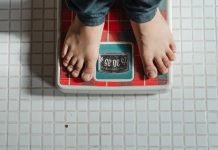Exercising and following a healthy diet, specifically an anti-inflammatory diet, can ease lower back pain.
Carrying extra weight, particularly extra fat in the abdomen, can put a lot of extra pressure on your lower pack, as much as 10 pounds of added pressure! Overeating and leading a sedentary lifestyle leads to more than an unhealthy appearance. Being overweight puts a lot of added stress on your spine, reduces flexibility, weakens lower back muscles, stresses out your trigger points and causes inflammation that may include the onset of arthritis.
Table of Contents
Obesity and Back Pain Linked
A study published in the Oxford Journals discuessed obesity and low back pain. Dr. Rahaman Shiri and his associates discovered a strong connection between those who are obese and those who seek treatment for chronic back pain. A poor diet may be to blame for low back pain because it increases inflammation in the body.
How to Lose Weight and Reduce Back Pain
There are some simple things you can do to lose weight and control back pain. For best results, combine a healthy diet and various exercises to reduce weight and build strength.
- Exercise. Whether you choose yoga, Pilates, strength training or stretching, these activities work to stabilize the core muscles and build muscles in the back. With improved flexibility, better posture and stronger muscles, your lower back pain will dissipate. Core training is particularly useful for tightening abdominal muscles and relieving back pressure.
- Manage stress. Being stressed out causes muscle tension. Find ways to relieve stress to loosen up the back muscles. Meditation, lightening your work load, or even taking interest in a new hobby can ease muscle tension.
- Practice good posture. Reduce back strain by practicing proper lifting, not sitting or standing too long in one place and not twisting the back. Its a good idea to stretch often and lift carefully.
- Follow an anti-inflammatory diet. While helping you lose weight, an anti-inflammatory diet can also reduce the toxins in your body that are the root of the pain. Generally, this type of diet includes foods in the their most natural form, with minimal to no processing. Avoid gains, trans fat, soda, dairy and sugar.
- Use supplements. In addition to an anti-inflammatory diet, you can take daily supplements to relieve back pain and aid weight loss. Magnesium, omega 3 fatty acid, calcium, chondroitin and green tea are a few examples of supplements that can help.
Losing weight, improving flexibility, strengthening the core and improving posture are all ways to ease the amount of pressure put on the back and relieve back pain.
Sources
- Parker, Hillary. “Proven Weight Loss supplements: Which Weight Loss Supplements Really Work?” WebMD. Dec, 2010.
- Sullivan, Todd. “Reduce Back Pain by ‘Deflaming,” Your Health Magazine. Oct, 2010.
- “Weight-Loss Therapies: Dropping Some Pounds May Help Your Back,” Health. org Apr, 2009.
- “The Association Between Obesity and Low Back Pain: A Meta-Analysis,” Oxford Journals. Oct, 2009.
- “Reduce Your Risk of Back Pain,” Beth Isreal Deaconess Medical Center. Mar 2011.



